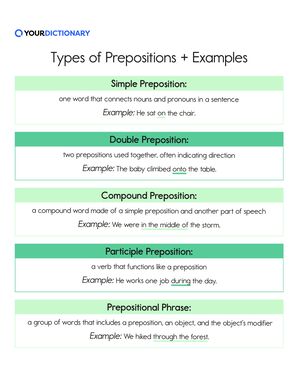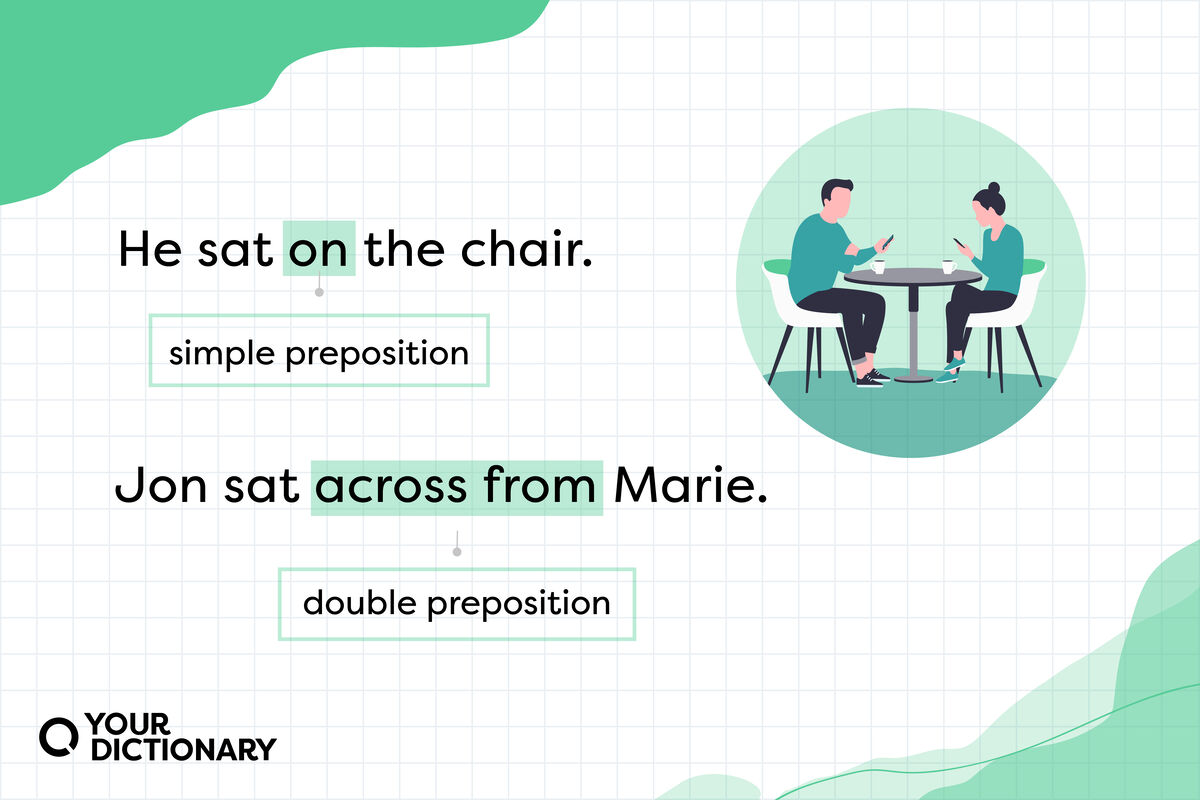

Prepositions are small words that get you in, on, to, with, and over where you want to be. But prepositions don’t have to be small to be helpful — from within, in addition to, according to, and over the rainbow are also types of prepositions. These words help to connect nouns and pronouns in a sentence, so you don’t end up saying, “I sat the chair” or some other gibberish.
What Do Prepositions Do?
Prepositions show the relationship between two parts of a sentence. Without prepositions, sentences would consist of nouns and verbs, but no words to show their position or location.
Prepositions can establish a noun’s place, time, direction, or connection to an idea.
- Incorrect: The dog sat the pillow. (How are the dog and pillow connected?)
- Correct: The dog sat on the pillow. (on shows the placement relationship between dog and pillow)
- Incorrect: We live two neighbors. (How are we and the neighbors connected?)
- Correct: We live between two neighbors. (between shows the positional relationship between we and neighbors)
While there are many in English, your sentence may need a more complex type of preposition. That’s where double prepositions, compound prepositions, participle prepositions, and prepositional phrases come in handy. Print off a handy guide to help you remember each of the five types of prepositions.

Simple Prepositions
Simple prepositions are common prepositions that consist of one word. Examples include:
- at
- for
- in
- from
- to
- off
- on
- over
- under
Examples of Simple Prepositions
When you use simple prepositions in a sentence, they typically come after a verb and before a direct or indirect object, known as the object of the preposition, to make connections between nouns and pronouns in a sentence (which are underlined below).
- He sat on the chair.
- There is some milk in the fridge.
- She was hiding under the table.
- The cat jumped off the counter.
- Barry drove over the bridge.
- Matilde lost her ring at the beach.
- The book belongs to Anthony.
- They were sitting by the tree.
Double Prepositions
Double prepositions are two simple prepositions used together, often indicating direction. Some examples include:
- into
- upon
- onto
- out of
- without
- across from
- within
- from beneath
- next to
Examples of Double Prepositions
Like simple prepositions, double prepositions establish relationships between nouns in a sentence.
- Once upon a time, there was a beautiful princess.
- The baby climbed onto the table.
- It is up to us to find the answer.
- The loud noise came from within the stadium.
- She never leaves without her phone.
- Joni sat across from Marie.
- The caterpillar turned into a butterfly.
- I was unable to get out of the appointment.
Compound Prepositions
Compound prepositions (also called complex prepositions) are a type of compound word that consists of a simple preposition and another part of speech. Common examples are:
- in addition to
- in consideration of
- according to
- in spite of
- under cover of
- in front of
- on behalf of
- in the middle of
Examples of Compound Prepositions
Compound prepositions are helpful ways to establish more complex relationships between nouns.
- I attended the meeting on behalf of my company.
- We were in the middle of the storm.
- He has gym class in addition to his regular classes today.
- In consideration of your feelings, I’ve decided not to resign.
- The burglar stole the money under cover of darkness.
- My car is parked in front of the mailbox.
- I got the job in spite of my inexperience.
- The weather will be good this weekend, according to Tom.
Participle Prepositions
Participle prepositions are verbs that function like prepositions. They have -ed, -ing, and -en endings, just like participial adjectives. Examples of participle prepositions include:
- considering
- during
- concerning
- including
- regarding
- frustrated
- provided
- given
Examples of Participle Prepositions
Even though participle prepositions don’t look like ordinary prepositions, they still function by establishing relationships between nouns and pronouns in the sentence (and are usually located right between them).
- She is interested in anything concerning horses.
- He works one job during the day and another at night.
- Given that we’re moving, we don’t need new patio furniture.
- All the neighbors were there, including Mr. Miller.
- The principal was asking questions regarding her behavior.
- Considering his age, he did a great job.
- He was frustrated at the situation.
- The teacher said no talking during class.
Prepositional Phrase Examples
Prepositional phrases are groups of words that include a preposition, an object, and the object's modifier. They function just like every other preposition, even though they might be several words long. Examples include:
- on time
- at home
- before class
- on the floor
- in my room
- through the tunnel
- over the bridge
- with my friends
Examples of Prepositional Phrases
Simple prepositions, double prepositions, compound prepositions, and participle prepositions can all appear in prepositional phrases.
- We hiked through the forest.
- The baseball game was canceled given the forecast of rain.
- John grabbed his homework from within his backpack.
- The children loved the gifts from their grandparents.
- He succeeded with a little help.
- We met to discuss the project about European explorers.
- She left muddy footprints on the clean floor.
- According to his wishes, his funeral will be private.
Types of Prepositions Quiz
Prepare for prepositions! Identify which type of preposition each bolded word is in the sentences below.
- He left in search of his fortune.
- It’s okay to bring your own bags into the store.
- Did you buy this ice cream for me?
- Don’t talk during the test.
- Let’s go on tour with our favorite band.
- Including my brother, there are ten people coming to the party.
- Kayla succeeded in the face of adversity.
- I’m not going to the game without you.
- With respect to my opponent's opinion, I must disagree.
- This big gift is from Tisha’s parents.
Types of Prepositions Quiz Answer Key
In which category does each preposition belong?
- He left in search of his fortune. (Compound preposition)
- It’s okay to bring your own bags into the store. (Double preposition)
- Did you buy this ice cream for me? (Simple preposition)
- Don’t talk during the test. (Participle preposition)
- Let’s go on tour with our favorite band. (Prepositional phrase)
- Including my brother, there are ten people coming to the party. (Participle preposition)
- Kayla succeeded in the face of adversity. (Compound preposition)
- I’m not going to the game without you. (Double preposition)
- With respect to my opponent's opinion, I must disagree. (Prepositional phrase)
- This big gift is from Tisha’s parents. (Simple preposition)